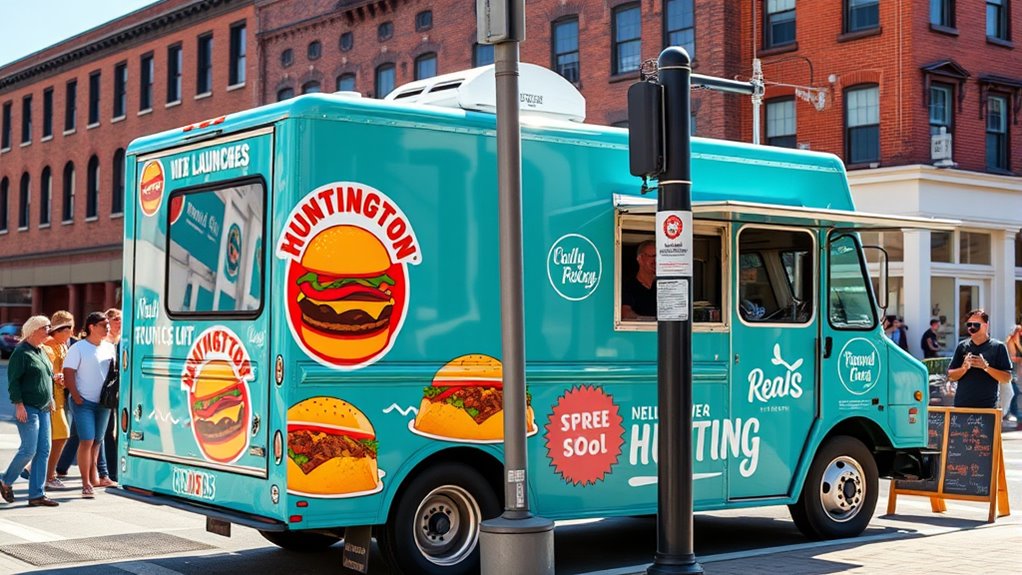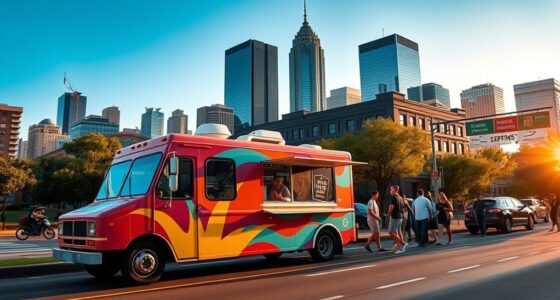To open a food truck in Huntington, West Virginia, you’ll need a West Virginia Retail Class A License, along with permits like a mobile food vendor permit costing $50 or $100. Budget around $40,000 to $150,000 for truck costs, plus initial inventory and permits. Choose locations where zoning laws allow food trucks, and develop simple, compliant menus. Using social media and local events can boost your visibility. Continuing will help you explore each step in detail.
Key Takeaways
- Obtain a West Virginia Retail Class A License and mobile food vendor permit, ensuring compliance with health, zoning, and city regulations.
- Budget $40,000-$150,000 for truck purchase, outfitting, permits, insurance, and initial inventory costs.
- Focus on operating in zoned commercial areas, avoiding residential zones unless by invitation, to ensure legal operation.
- Develop a simple, portable menu with easy-to-store ingredients, emphasizing quick service and health compliance.
- Utilize social media, participate in local events, and implement loyalty programs to effectively market and attract customers.
Navigating Permits and Licensing Requirements
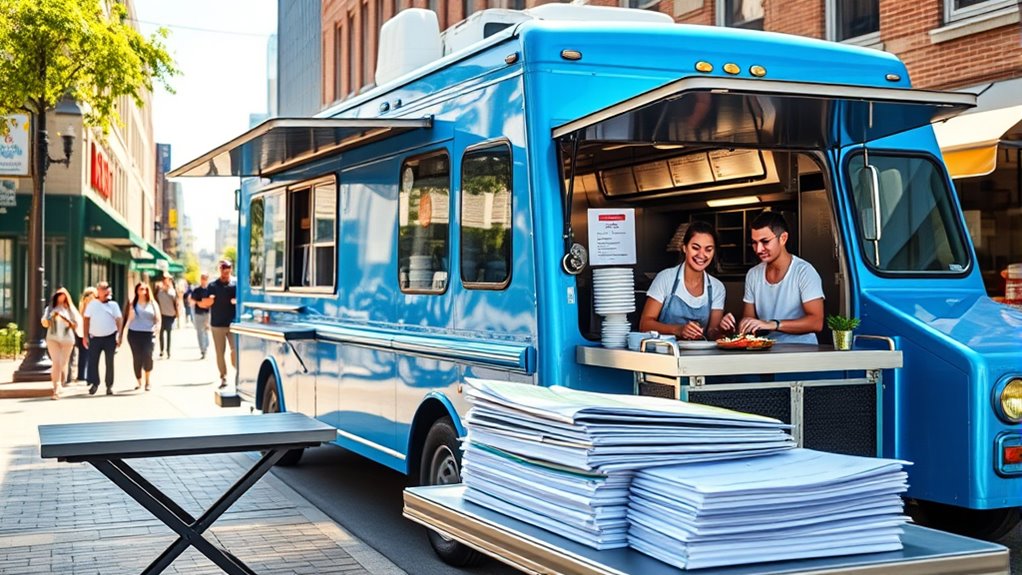
Arranging permits and licensing requirements is essential for legally operating a food truck in Huntington, WV. First, you’ll need a West Virginia Retail Class A License, which covers on-premises food sales. This license requires maintaining at least $500 in food inventory and verifying age for alcohol sales. You’ll need to submit documentation like a valid lease, health permit, and floor plan, with fees totaling around $1,583.33. Additionally, if your truck serves alcohol, county approval might be necessary. You also need a Mobile Food Vendor Permit from the city, costing $50 or $100, which requires proof of insurance, vehicle details, and owner information. Compliance with city ordinances and health department regulations is mandatory to operate legally and safely on Huntington’s streets. Understanding local regulations and legal compliance is vital for a smooth operation and avoiding potential fines or closures.
Understanding Costs and Fee Structures
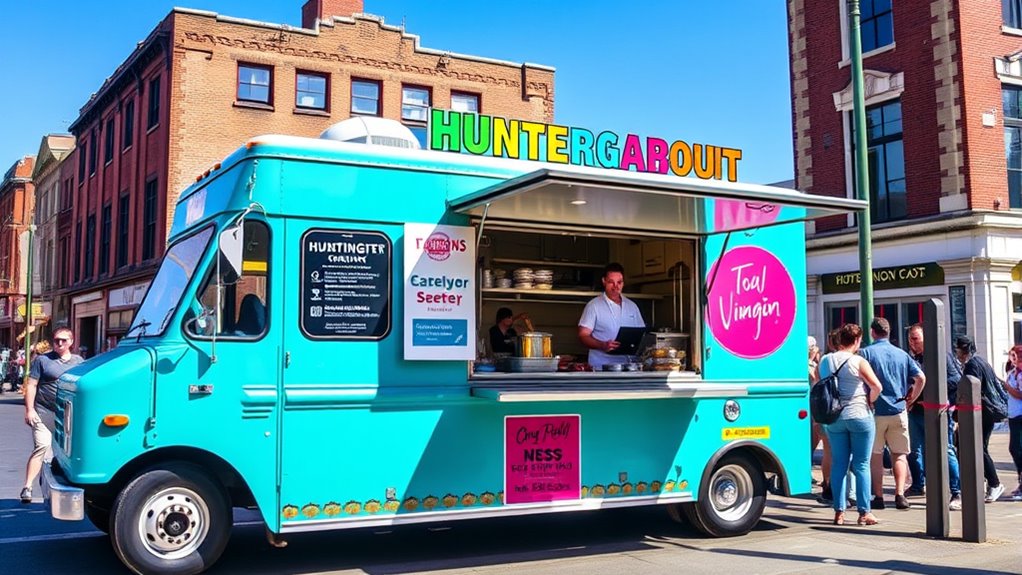
Understanding the costs and fee structures involved in operating a food truck in Huntington, WV, is essential for budgeting and financial planning. You’ll need to contemplate vehicle expenses, permits, and ongoing overheads.
- Purchasing and outfitting a truck can cost between $40,000 and $150,000, though used trucks and retrofits may reduce upfront costs but increase maintenance.
- Initial inventory and serveware typically run around $2,300, with fuel and routine maintenance reserves of $500–$1,000.
- Local fees include a Huntington business license at $20, a Certificate of Occupancy at $75, and various permits that vary in cost.
- Monthly expenses like ingredients, fuel, insurance, and labor can add up quickly, requiring careful planning and budgeting.
- Understanding permit requirements in Huntington is crucial, as local regulations can influence the total startup costs and ongoing fees.
Choosing the Right Locations and Zoning Compliance
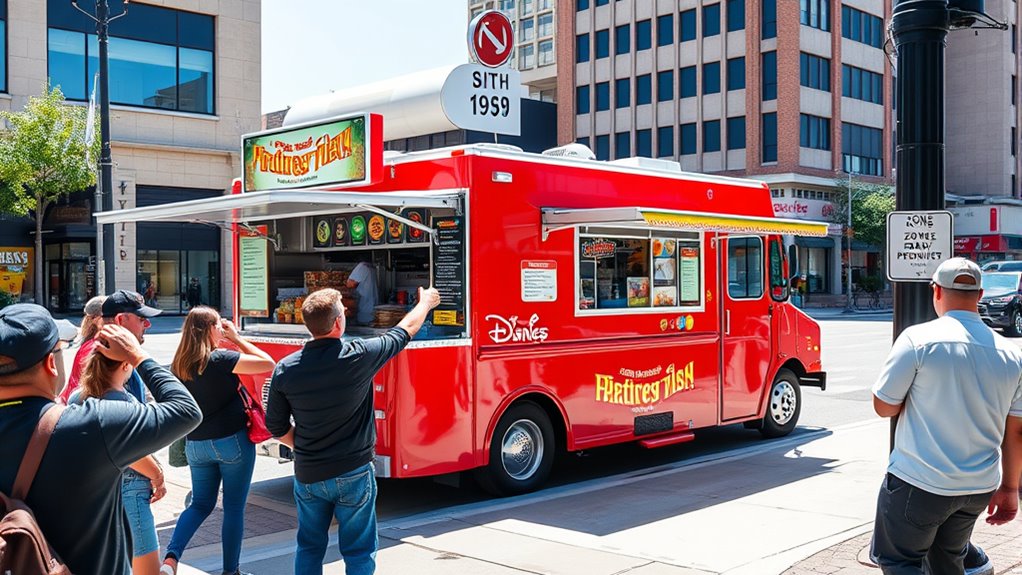
Choosing the right location is essential for the success of your food truck in Huntington, WV, and compliance with zoning laws is a key part of that process. You must operate only where zoning ordinances permit food service on private property or in approved zones. Residential areas typically allow food trucks only by invitation, and transient stops under 10 minutes may be exempt. To avoid fines or permit issues, select commercial zones where food trucks are permitted long-term. Always verify zoning districts using Huntington’s zoning code. Ensuring your operation aligns with zoning compliance helps prevent legal issues and supports sustainable business growth.
Developing a Food Menu That Meets Regulations
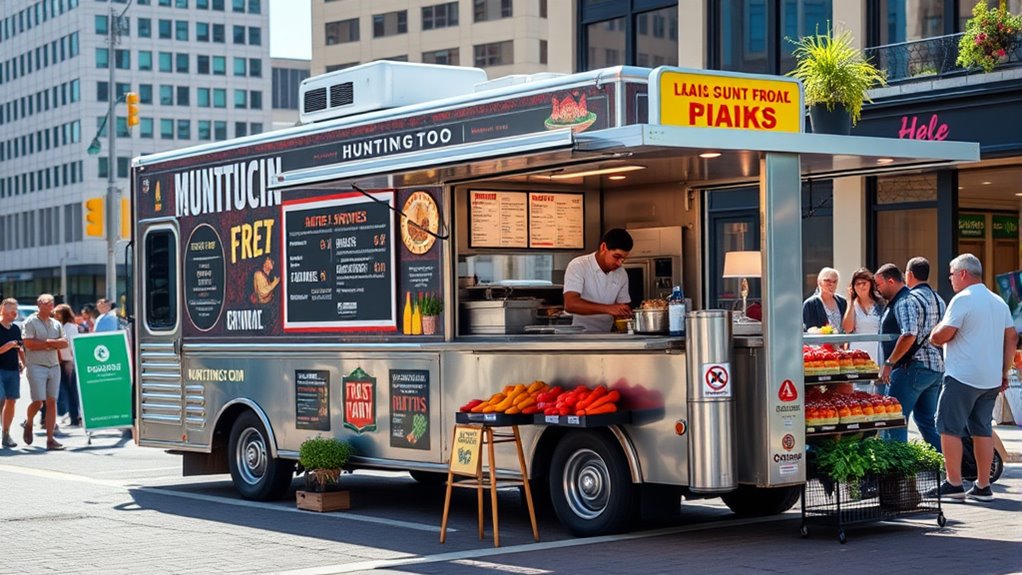
Developing a food menu that complies with regulations starts with selecting items that can be prepared safely and efficiently using your limited kitchen equipment. Focus on simple, quick-to-prepare dishes that fit within your space and appliance constraints. Use ingredients that are easy to store and handle, ensuring proper refrigeration at all times. Make sure your menu avoids complex cooking processes requiring large or specialized appliances. Incorporate pre-prepared or partially prepared ingredients to streamline operations and meet hygiene standards. Additionally, consider menu items that can be served on-the-go without sacrificing quality or safety. This approach helps maintain compliance with health codes and licensing requirements while offering appealing options to customers. Proper planning of food safety procedures is essential to prevent contamination and ensure customer trust.
Effective Marketing Strategies and Customer Engagement
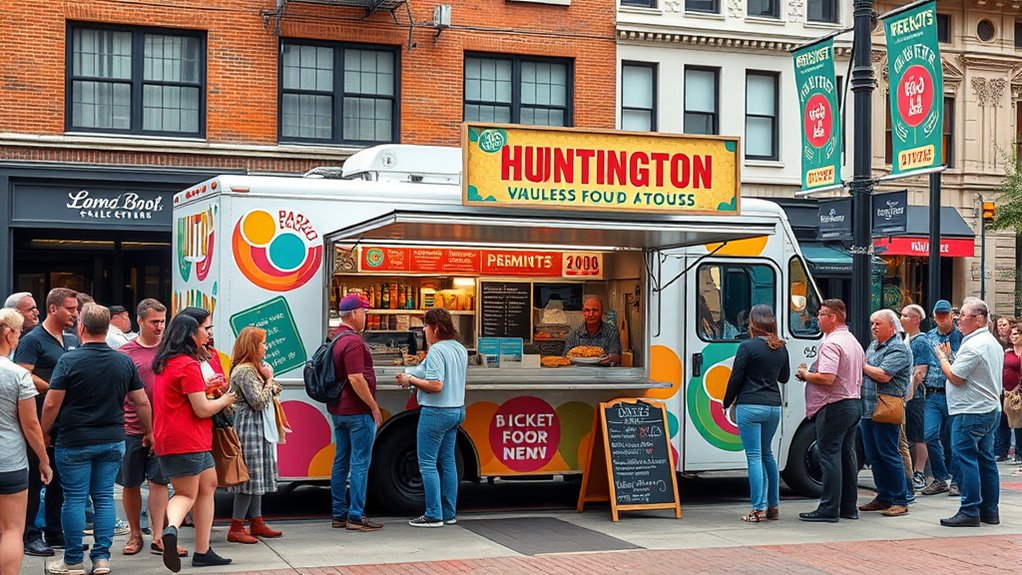
Are you making the most of your food truck’s marketing potential? Leveraging social media is key—68% of food trucks use it regularly, with Facebook being the top platform for 75%. Engaging customers online can boost sales by around 20%, and mobile apps for locating trucks have seen a 35% rise in downloads, reflecting growing tech engagement. Participating in local events and festivals (80% of trucks do this annually) increases visibility and foot traffic while fostering word-of-mouth growth. Loyalty programs, adopted by over half of trucks, can increase repeat visits by 30%, especially when combined with personalized email marketing. Using data analytics and GPS technology helps identify peak times, popular items, and ideal locations, ensuring your marketing efforts are targeted and effective. Transparency regarding affiliate marketing disclosures and data collection practices can also build trust with your customers and enhance your reputation.
Frequently Asked Questions
How Long Does the Permit Approval Process Typically Take in Huntington?
You’re wondering how long the permit approval process takes in Huntington. Typically, it ranges from 2 to 6 weeks, depending on municipal review, health inspections, and document completeness. Delays often occur if applications lack required paperwork, inspections need rebooking, or zoning approvals are needed. Planning ahead, submitting complete applications, and scheduling health inspections early can help you prevent unnecessary delays and ensure a smoother approval process.
Are There Specific Restrictions on Operating Hours for Food Trucks?
You’re wondering about operating hours for food trucks in Huntington. Local laws restrict truck operation mainly to 6 a.m. to 3 a.m., with limitations for residential areas and public property. You can’t leave trucks unattended overnight or operate in certain zones without permits. Parks and special event rules might have different hours, and health inspections could also influence your schedule. Always check specific location rules and secure necessary permits to stay compliant.
Can I Operate a Food Truck in Multiple Locations Simultaneously?
Like a tightrope walker balancing carefully, you can operate a food truck at multiple locations, but it’s tricky. You must obtain permits for each site, comply with local health and safety rules, and make certain your vehicle remains in motion, not stationary. Restrictions on operating hours and location-specific permits make simultaneous operation complex. Planning and coordination are key to successfully managing multiple sites without losing your footing in this culinary circus.
What Are the Insurance Requirements for Food Truck Operators in Huntington?
You need to meet specific insurance requirements to operate your food truck in Huntington. Make certain you have general liability coverage for bodily injury and property damage, and a commercial auto policy for your truck. If you have employees, workers’ compensation is essential. Consider adding product liability for foodborne illnesses, equipment coverage, and possibly liquor liability if you serve alcohol. Keep proof of insurance ready for city officials, event organizers, and health inspectors.
Are There Grants or Financial Assistance Programs Available for New Food Trucks?
Imagine your food truck dream as a seed waiting to sprout. In Huntington, you can water it with grants and financial aid. Local organizations, regional incubators, and state programs offer microgrants, recovery funds, and low-interest loans to help your venture grow. Federal sources like the SBA and USDA also provide loans and grants. Reach out early, explore partnerships, and position your idea to ride the wave of available support.
Conclusion
Starting your food truck in Huntington might seem intimidating, but with the right permits, a solid plan, and creative marketing, you’re well on your way. Have you considered how your unique menu and location choices could set you apart? Embrace the process, stay compliant, and connect with your community—success is just around the corner. Are you ready to turn your food truck dream into reality and serve up something special?
